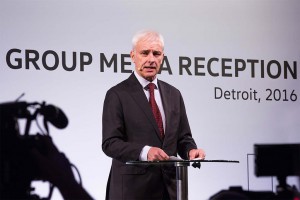Volkswagen AG executives must be thrilled that the company acquired Audi and Porsche many years ago because it was those two brands that led VW to a record underlying profit for 2016 of $15.5 billion, up 14% from 2015.
The record comes despite larger-than-predicted charges the maker needed to take due to its ongoing diesel emissions scandal. The tab for that has shot past the $21 billion mark going forward, and as a result it missed its operating profit predictions.
VW took a bigger-than-expected charge of $6.8 billion for the emissions-test rigging scandal. Predictions were a charge of about $4.5 billion.
Despite some analyst estimates that the final bill could exceed $30 billion, the automaker expects “stable” earnings for 2017 as it works to redeem its reputation in its second-biggest market: the U.S.
(Volkswagen union balks at potential cuts. Click Here for the story.)
Part of that “redemption” involves a quick and substantive shift away from diesels to electric vehicles while it continues to see its brands, including Volkswagen, perform well in other countries. In fact, Volkswagen passed Toyota last year to become the biggest automaker on earth by sales volume with 10.3 million units.
China continues to be VW’s salvation, although sales there fell 4% in January, all of its competitors were down by even larger numbers. The company predicted an underlying operating margin of between 6 and 7% for 2017, compared with the 6.7% last year.
VW’s Chief Executive Matthias Mueller said the carmaker was on the right track for the future.
(Who knew what and when: top VW managers turning one another. To see the story, Click Here.)
“As the figures show, Volkswagen is very solidly positioned in both operational and financial terms. This makes us optimistic about the future,” he said in a statement.
The company’s profits may foster an improved relationship between the maker and its union, which have been wrestling with a variety of issues, including the high labor costs at its German plants and how it will impact future profits, Reuters noted.
VW said it would propose a dividend of 2.06 euros per preferred share, more than the 1.86 euros expected by analysts on average, and 2.00 euros per ordinary share for 2016.
(Toyota cedes global sales crown for 2016 to VW. Click Here for the story.)
That is up from 0.17 euros and 0.11 euros respectively a year earlier, when VW had to cut the dividend because of the cost of the diesel emissions cheating, Reuters noted.

